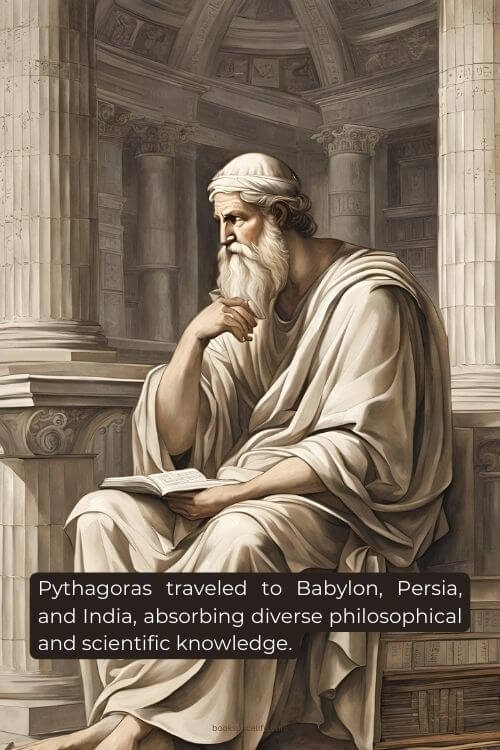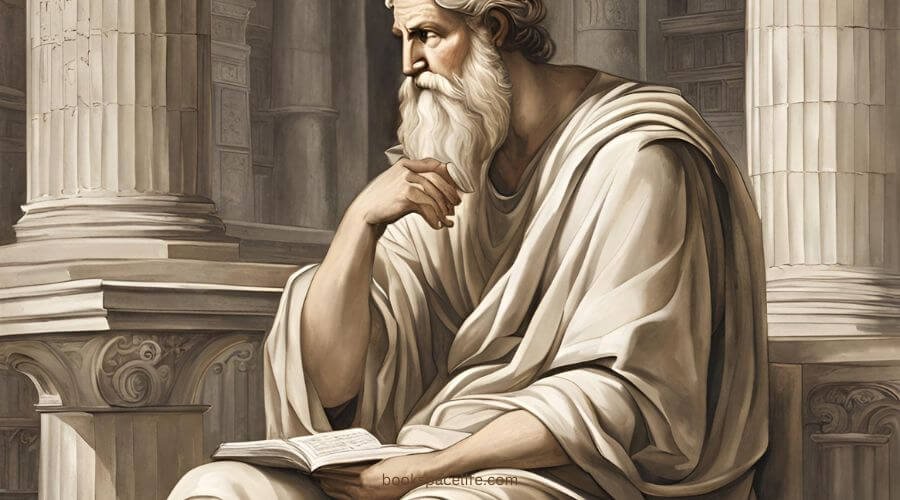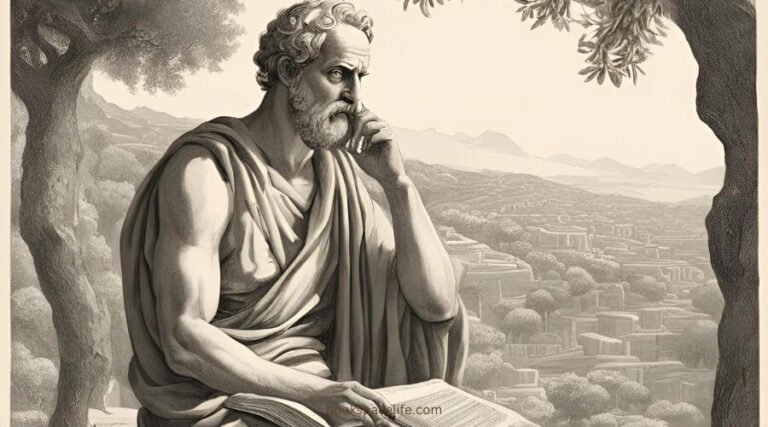Anaximander
The Philosopher-Mathematician Who Shaped Western Thought
Pythagoras of Samos (c. 570 – c. 495 BCE) is a name that resonates through the annals of philosophy and mathematics, embodying the intersection of these two fields.
Known primarily for the Pythagorean theorem in mathematics, Pythagoras was also a profound philosopher who founded a movement that significantly influenced Western thought.
His contributions extend beyond mere mathematics; they encompass metaphysics, ethics, and the understanding of the cosmos.
This blog post explores Pythagoras’s life, travels, early education, philosophical contributions, and his lasting influence on subsequent generations.
Quick Read
Table of Contents
(1) Early Life and Education
Pythagoras was born on the island of Samos, located in the Aegean Sea, around 570 BCE.
While little is definitively known about his early life, it is believed that he came from a wealthy family, which likely afforded him a solid education.
Pythagoras’s early influences included the Ionian philosophers, who sought to explain the nature of the universe through rational thought and observation.
As a young man, Pythagoras traveled extensively throughout the Mediterranean, seeking knowledge and wisdom.
His travels took him to Egypt, where he studied mathematics, astronomy, and religious philosophy, and to Babylonia, where he encountered advanced numerical systems and astronomical knowledge. These experiences played a critical role in shaping his philosophical outlook and his later teachings.

(2) Philosophical Development
Pythagoras founded a religious and philosophical school, often referred to as the Pythagorean school, which combined elements of mathematics, science, and mysticism. His philosophy can be encapsulated in several key concepts:
- The Significance of Numbers: Central to Pythagorean thought is the belief that numbers are the essence of all things.
He famously stated, “All is number.” Pythagoras and his followers believed that mathematical relationships could explain the universe’s underlying structure, from the harmony of musical intervals to the geometry of physical space.
The Pythagorean theorem, which relates the lengths of the sides of a right triangle, is perhaps the most famous mathematical principle attributed to him.
- Harmony and Order: Pythagoras viewed the universe as an ordered and harmonious system governed by mathematical laws.
He believed that understanding these laws could lead to a deeper appreciation of the cosmos and humanity’s place within it.
This concept of harmony extended beyond mathematics into music, where Pythagoreans explored the relationships between musical notes and numerical ratios, establishing a profound connection between mathematics and music.
- The Soul and Reincarnation: Pythagorean philosophy incorporated religious elements, particularly the belief in the immortality of the soul and the cycle of reincarnation.
Pythagoreans taught that the soul undergoes a series of rebirths, and through philosophical study and ethical living, it can attain purification and ultimately reunite with the divine.
This emphasis on the soul’s journey influenced later philosophical and religious thought.
- Ethical Living and Community: The Pythagorean school emphasized the importance of ethical living and communal life.
Pythagoreans followed strict rules concerning diet, behavior, and social interactions, promoting a lifestyle that sought harmony not only in numbers but also in daily life.
They practiced vegetarianism, abstaining from meat as part of their ethical beliefs about the sanctity of life.
- Mathematics as a Path to Understanding Reality: Pythagoras believed that engaging with mathematics was a way to understand the fundamental nature of reality.
This belief laid the groundwork for future philosophical inquiries into the relationship between mathematics and the natural world, influencing later thinkers such as Plato, who integrated mathematical principles into his philosophical framework.
to the development of natural philosophy, paving the way for later scientific thought.
(3) Influence and Impact
Pythagoras’s teachings had a profound influence on subsequent generations of philosophers, mathematicians, and scientists. His legacy can be observed in several key areas:
- Foundational Role in Mathematics: Pythagoras’s contributions to mathematics are foundational.
His work on numerical relationships and geometric principles laid the groundwork for future mathematical exploration.
The Pythagorean theorem remains a cornerstone of geometry taught in schools today, and his exploration of mathematical relationships influenced the development of algebra and number theory.
- Impact on Philosophy: Pythagoras’s synthesis of mathematics and philosophy established a tradition that would be further developed by later philosophers.
His emphasis on the importance of rational thought and the pursuit of knowledge shaped the course of Western philosophy.
Plato, in particular, was influenced by Pythagorean ideas, integrating them into his own philosophical system.
- Influence on Science: The Pythagorean belief in the harmony of the universe had a lasting impact on the development of scientific thought.
The connection between mathematics and the natural world laid the groundwork for later scientific inquiry, contributing to the scientific revolution and the emergence of disciplines such as physics and astronomy.
- Religious and Mystical Traditions: Pythagorean ideas about the soul, ethics, and the cosmos influenced various religious and mystical traditions in the ancient world and beyond.
The emphasis on the immortality of the soul and the pursuit of ethical living resonated with later philosophical and religious movements, including Neoplatonism and early Christian thought.
- Cultural and Historical Significance: Pythagoras’s life and teachings reflect the rich intellectual culture of ancient Greece, where the pursuit of knowledge was seen as a noble endeavor.
His contributions represent a pivotal moment in the history of human thought, marking a transition from mythological explanations of the world to rational, systematic inquiries.
- Legacy in Education: The Pythagorean school served as a model for later philosophical schools and educational institutions.
The emphasis on communal living, ethical conduct, and the pursuit of knowledge became integral components of philosophical education in ancient Greece and beyond.

(4) Conclusion
Pythagoras of Samos stands as a towering figure in the history of philosophy and mathematics, whose contributions have shaped Western thought for centuries.
His innovative ideas about the nature of numbers, harmony, and the soul reflect a profound engagement with the mysteries of existence.
Through his synthesis of mathematics and philosophy, Pythagoras paved the way for future inquiries into the fundamental nature of reality, encouraging subsequent thinkers to explore the connections between numbers, ethics, and the cosmos.
His legacy endures in contemporary discussions about mathematics, philosophy, and science, inviting us to reflect on the intricate relationships that define our understanding of the world.
As we contemplate Pythagoras’s life and teachings, we are reminded of the power of human inquiry and the enduring quest for knowledge that characterizes the human experience.
His work serves as a testament to the transformative potential of philosophy and mathematics, inspiring us to seek wisdom and understanding in our own lives and to recognize the beauty and harmony inherent in the universe.
(A) Pythagoras – 7 Facts
- Born on Samos – Pythagoras was born on the Greek island of Samos around 570 BCE.
- Early Education in Egypt – He studied mathematics, astronomy, and religion in Egypt for over a decade.
- Traveled Widely – Pythagoras traveled to Babylon, Persia, and India, absorbing diverse philosophical and scientific knowledge.
- Pythagorean Theorem – He is famous for the Pythagorean theorem, relating the sides of right triangles.
- Founded Pythagorean School – He established a religious and philosophical school in Croton, Italy.
- Believed in Soul Transmigration – Pythagoras taught that souls reincarnate into new bodies after death.
- Emphasis on Harmony – He viewed the universe as structured by mathematical harmony, especially in music and nature.
(B) Pythagoras – 10 Quotes
- All is number. Emphasizing the importance of numbers in understanding the universe.
- There is no greater danger than the lack of knowledge. Highlighting the significance of knowledge and education.
- Do not say a little in many words but a great deal in a few. Advocating for concise and meaningful communication.
- Wisdom begins in wonder. Suggesting that curiosity is the starting point of knowledge.
- The soul is immortal and the body is a temporary vessel. Expressing his belief in the immortality of the soul.
- A good friend is like a sun in your life. Emphasizing the value of friendship and companionship.
- As soon as anyone starts to think, he becomes a philosopher. Suggesting that the act of thinking is the essence of philosophy.
- In harmony, there is beauty. Reflecting his belief in the connection between harmony and aesthetic beauty.
- The number three is a perfect number. Highlighting the significance of the number three in his teachings.
- It is better to be silent than to argue with a fool. A wise reminder about choosing one’s battles wisely.








